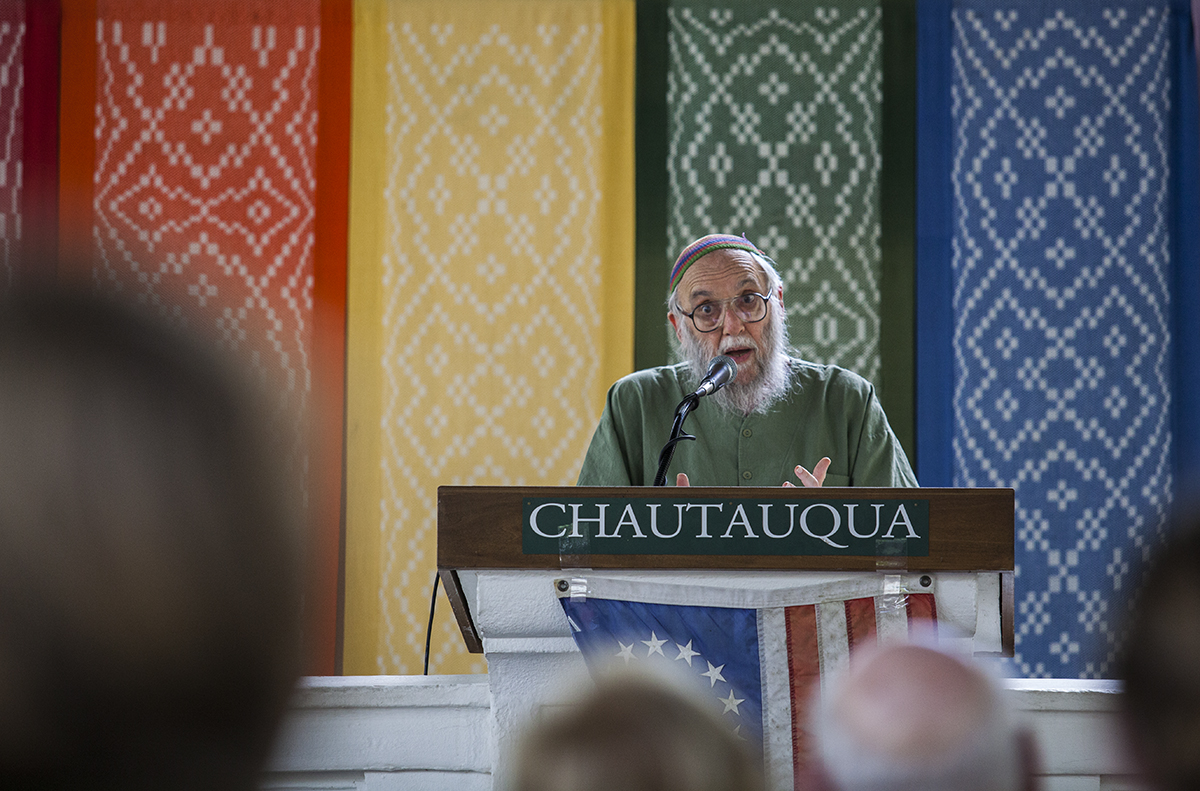Rabbi Arthur Waskow opened his talk with a song.
He sang the final verse of “America the Beautiful” to begin his lecture “The Declaration of Independence: What Would Jefferson Write Today?” as part of Week Two’s Interfaith theme, “The Genius and Soul of a Nation,” Wednesday in the Hall of Philosophy.
This verse includes these lyrics: “O Beautiful for patriot dream/ That sees beyond the years/ Thine alabaster cities gleam/ Undimmed by human tears!/ America! America! God shed His grace on thee/ And crown thy good with brotherhood/ From sea to shining sea!”
“I think that song, that verse of the song, which was written by Katharine Lee Bates in 1893, carries within it two attitudes toward life that we mostly (treat) as if they’re separate,” said Waskow, founder and director of The Shalom Center. “One is celebration, and the other is heartbreak.”
He discussed that particular year in American history, during which, he said, “a real populist party” and “corporations that controlled practically all of America’s economical and political life” were at odds. Bates saw this, Waskow said, and it broke her heart.
“At the same time, she celebrated the America that was beautiful for a dream,” Waskow said. “It was easy to say it beautiful for prairies, for oceans; it was harder to say it was beautiful for a dream, not then and not yet achieved.”
There is a minister in Chautauqua, Waskow said, who has been approached by several people with questions. Members of the community have come to him asking how to “cope with their grief about our country.” Waskow suggested people could respond to this grief through “celebration and heartbreak in the same breath, in the same heart.”
Waskow made note of the American flag, a flag “not of a great imperial country stretching across the continent with two of those 50 states in the stars, one of them in the middle of the Pacific, the other one way beyond on the continent, but a flag made by a dressmaker, a seamstress in a tiny little house in Philadelphia. It was a flag that envisioned something new.”
And to envision something new, he said, he likes to revisit something old. Waskow discussed imagining the “best possible (Thomas) Jefferson,” despite some of Jefferson’s hypocrisy — he was a slave owner but “attacked slavery” in the Declaration of Independence.
“I am not willing to throw Thomas Jefferson out of the great, forward-looking persons of not only American, but world, history,” Waskow said.
One method of “encoding celebration and heartbreak,” both of which are found in Jefferson’s life, Waskow said, is the Jewish midrash, which defines the reinterpretation of a sacred text. Waskow said this reinterpretation is best used when “transforming it as life expands as we learn both from that text, beyond that text, and as we learn from life beyond that text.”
Waskow read the Declaration of Independence — the first paragraph as is, and the following paragraphs with his own midrash applied, as he views the document as a sacred text.
“We now face a political and economic system contrary to these values,” he said after reading, “destructive of democracy and dangerous to the liberty, the prosperity, the happiness of a free people.”
Following the reading, Waskow asked the audience to participate in an activity: five minutes of sharing grievances about the current American political climate together. His goal was for this to model the civil dialogue Americans could experience by “bringing our grief out to each other, to the public (and) to the community.”
He discussed two major instances where grief inspired change in history — the first being the Constitutional amendments and the second being the Progressive Era. With those ideas in mind, Waskow described six amendments he would implement today.
These included “the existence of a climate, a web of life and viable species that is life-giving,” a proposal for workers and a suggestion for large business corporations in the United States.
He suggested a Constitutional amendment requiring a review of businesses “to ensure and enforce that they are meeting the needs and balancing the interest, not only of their stockholders, but also of their workers, their customers, the earth and society as a whole.”
Waskow also proposed an amendment for naturalization of American citizens, an amendment regarding election campaign funding and an amendment suggesting that presidential elections be determined by the popular vote.
“The letter of the law is never enough,” Waskow said. “It’s necessary, but it’s not enough. We face a crisis at this moment in our society because there are … very large clumps of people who feel excluded or marginalized in American culture and American society.”
He listed a few of these “clumps”: the black community, Latinos, “independent-minded women,” Muslims, immigrants and the LGBTQ community.
“Spiritually, it’s just not legitimate to marginalize any human being, and politically, in the United States of America, it’s a political disaster to marginalize any group of human beings,” Waskow said.
He said the solution is “not to shift away, but to broaden” involvement with these marginalized groups.
April 4, 2018, is the 50th anniversary of Martin Luther King’s death. Waskow admired King’s work and requested action, instead of sobriety, on that day.
“Could we make that day a day of atonement?” he asked. “A day of — the pun is important — a day of ‘at-one-ment’ in American society?”
Waskow closed his lecture by playing “Democracy” by Leonard Cohen through the microphone.
“It is not an easy, sweet celebration of a democracy that already exists,” he said of the song. “It talks about how hard it was to get this far, and that democracy is still coming, not yet here.”





